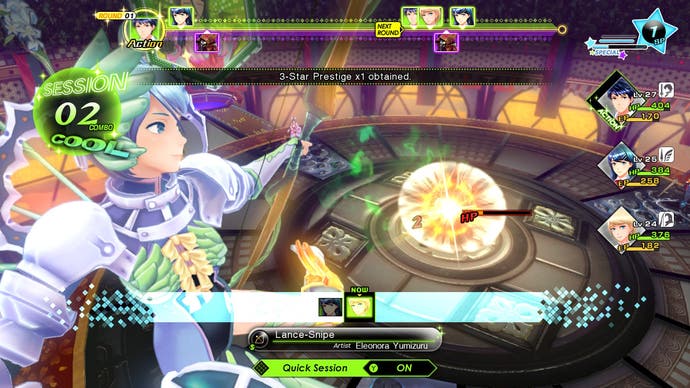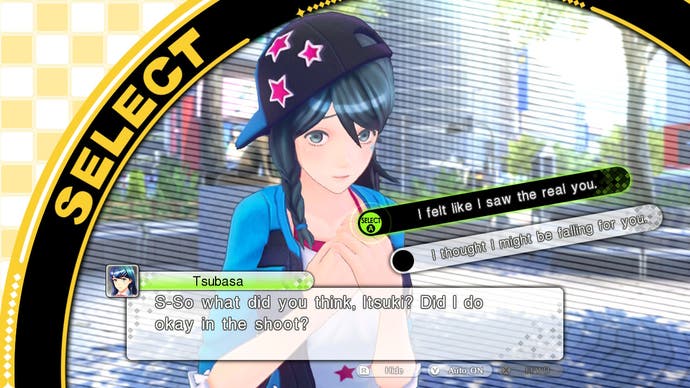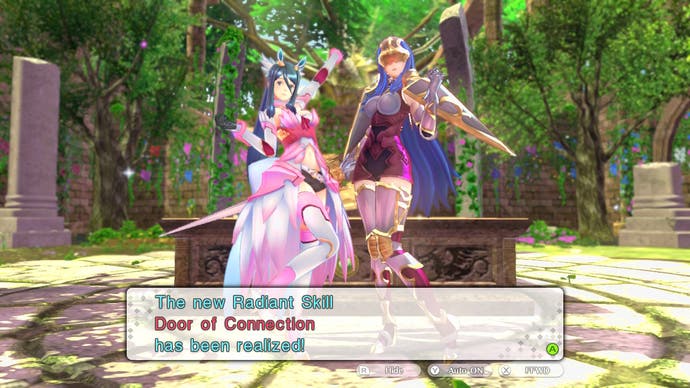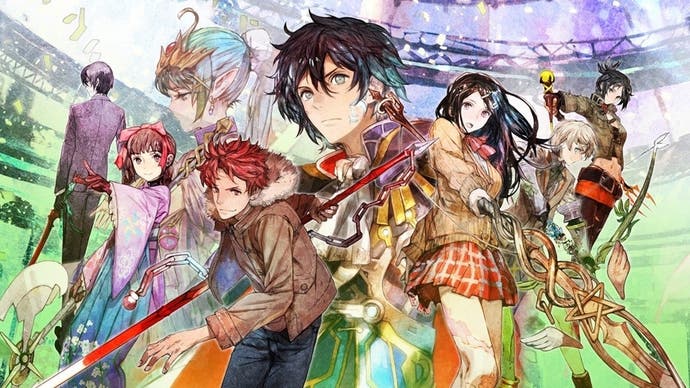Tokyo Mirage Sessions #FE Encore review - stylish crossover that misses its potential
Once again.
I love a good crossover, even if they're often limited to fighting games and online events. It's exciting to see developers being fans of each other and working together to interpret and merge each other's stuff, culminating in an enthusiastic collaboration across the industry. With this in mind, Tokyo Mirage Sessions, a crossover between the Fire Emblem and Shin Megami Tensei series, sounds like a pretty fantastic idea.
It focuses on the friends Aoi Itsuki and Tsubasa Oribe. Ever since Tsubasa's sister Ayaha disappeared during a concert five years prior, the timid girl wants to become a singer to continue her sibling's legacy as an entertainer. During her very first audition, Tsubasa is attacked by mirages, demons who are after the natural artistic ability within humans. To fight back, Tsubasa and Itsuki gain the power of Chrom and Caeda from the Fire Emblem series, who help them change into magical "carnage forms". Unfortunately their new friends have lost all memory of who they are and where they're from. The only thing that's clear is that mirages regularly attack entertainers, so what better way than to join an entertainment agency to keep an eye on these occurrences?
It's not the smoothest integration of a theme into its setting, but the entertainment industry gives Tokyo Mirage Sessions its own identity beyond being a crossover, in ways both good and bad. Let's start with the good: Tsubasa and friends are training to become idols, Japanese all-around entertainers, and Tokyo Mirage Sessions makes great effort to showcase different facets of the job. Each chapter is dedicated to another aspect, whether that's being a model, an actor or a show host. Chapters also often culminate in short anime music videos of your characters performing a new song. The round-based battles take place on a stage, a mass of adoring fans following your performance from the stands. Your characters whirl around acrobatically, draw their signatures in the air for every spell and cheer for each other. Each hero is wearing elaborate costumes that spell love for magical girl and boy design. If you complete side quests for the members of your party, they gain special attacks reminiscent of their signature performances. Each win is celebrated with applause and an amount of confetti I haven't seen since Ace Attorney.
Without this stylish veneer however, combat is a familiar affair. Similar to the Persona games, themselves a sub-series of Shin Megami Tensei, offence is the best defence, and you have the best chances of winning if your opponent doesn't even get the drop on you. If you can exploit an enemy's weakness, for example by attacking them with a specific weapon or spell, you start a Session. If they have the right skill equipped, during a Session your other team members get to chain an attack immediately to yours, more often than not leading to a monster's immediate demise. Battles are vibrant to watch without dragging on, and I loved every unnecessarily bombastic transformation and attack. If they still run too long for you, the Encore version now allows you to enable quick sessions and skip special attack sequences with the press of a button.

I also liked the dungeons. While the first one is pretty drab, the subsequent ones follow the style of the different chapters and each come with a different gameplay element. In one dungeon depicting a TV show set, for example, you run errands for a demonic production supervisor.
So far so good, but while I enjoyed Tokyo Mirage Sessions at first, as a crossover it's decidedly weak. It retains the modern Tokyo setting from Shin Megami Tensei, but there isn't much to do. Some characters, like Tsubasa, are really likable, others fall flat because they often only talk to you instead of each other, so don't expect too much depth in the social element. During main quests, dungeons are pretty large, as typical for an Atlus game, but each features only one unique gameplay element, so after a while you will have done the same thing for hours, whether that's solving switch puzzles or navigating changing floor layouts. To fully heal your party and unlock new skills, you have to visit your agency, so while you gain the ability to warp there early on, you still have to traipse back every time, a far cry from just having the entrance to the Velvet Room at the beginning of each dungeon.
It takes more than half of the game for Tokyo Mirage Sessions to remember that the #FE in its title stands for Fire Emblem. Generally, the Fire Emblem influence remains incredibly easy to ignore, certainly due to the Fire Emblem developer Intelligent Systems hardly having had a hand in either design or development. That makes Tokyo Mirage Sessions approachable for people who are unfamiliar with either series, but it seems odd to market something as a big crossover of two beloved properties and then skimp on the crossover elements.

With this in mind I wanted to judge Tokyo Mirage Sessions purely on its merit as a magical idol RPG, which raises a few difficult points. The whole idol industry has been a pretty niche interest in the West, until Korean idols such as BTS turned into international sensations. The idea of magical girl idols, who sing and dance by day and transform into fighters for justice by night, was devised with young girls in mind, right until the moment someone realised that there's a lot of money in sexualising this concept. That's where Tokyo Mirage Sessions comes in, because it's not a game made for a target audience of young girls, but what quickly turned out to be the new number one customer of the idol industry - guys who like their girls to be what we consider barely legal, or let's be honest, not at all. The idol industry sells itself in the perceived innocence of its performers. While several local different local laws apply, the age of consent in Japan is 13, which is why what we consider the sexualisation of minors is in fact perfectly legal, if still questionable and a very convenient loophole to sell idols not to hormonal teenagers, but adult men, whose gaze is the predominant focus of the game (as it is for most of the video game industry).
Protagonist Itsuki was purposefully designed as an everyman, an unassuming dude in argyle sweaters who is enough of a blank page that through him, players can live the fantasy having an idol all for themselves. "What do you think of my outfit?" Tsubasa will ask him, "How about this pose?" "Uwwah, help me, I'm so embarrassed to show myself to others like this, but doing this for you feels natural!" There's a side quest in which Itsuki teaches his friend Touma "nanpa", picking up women on the street. Just like any sort of pick-up artistry, nanpa is rarely associated with someone bumbling "Hey, come here often" and more with rape at worst and sleaziness at best. Yet, Tokyo Mirage Sessions makes Itsuki into a napa master, the hero popular with all the ladies, and only after the fact does someone ask if picking up women is really the best way to become a successful entertainer.
Of course a lot of Japanese content uses fanservice, but Tokyo Mirage Sessions is made uncomfortable by the reality of the industry it portrays. The idol industry is real, and directly responsible for the expectations fans have of how women should look and behave. In order to seem available, idols are barred from dating, leading to incidents such as obsessive fans threatening them for being seen with male idols in TV shows or private outings. Minami Minegishi, members of Japan's largest girl idol group AKB48, once shaved her head as penance for dating. In 2016 Tatsuya Yamaguchi, bassist of hyper-popular idol band TOKIO, admitted to having tried to kiss an underage girl he frequently invited home with him - he'd promised to make her a famous idol. Just last year, an executive at an idol agency was convicted of several cases of grooming. Several idols were convicted of drug possession, in Japan a career-ending event, and most idols admitted that without stimulants they couldn't keep up with their extraordinary workload. There's a large cost in upholding the fantasy of the idol, especially for young girls.

Nintendo released a cut for Western territories. Changes include raising almost all character's ages to the age of consent in most countries, deleting panty shots and the revision of overly revealing costumes. Additionally a quest focusing on gravure modeling, a term for idols suggestively modeling in swimwear and underwear, was completely reworked to focus on fashion modeling instead. In an interview with Game Informer prior to the game's original Wii U release, representatives from Nintendo America stated that "It was a priority to ensure the game feels familiar and appeals to longtime Atlus fans. Any changes made to the in-game content were due to varying requirements and regulations in the many different territories Nintendo distributes its products."
While the Encore version also adds DLC content such as costumes, a new song and the albeit limited opportunity to have support characters further help out in battle, this Switch version is otherwise based on this altered version. I find the changes easy enough to ignore and I think anyone who gets incensed about less exposed skin on their anime girls should perhaps take a healthy walk around the block, Tokyo Mirage Sessions is still plenty sexual. Elements from boob jiggling to introducing characters cleavage first to many costumes that remain as revealing as ever can still be found.
If you want to truly learn more about the idol industry, here you'll hear mostly platitudes, and beyond that all elements from characters to combat stay rather simple. As it stands, Tokyo Mirage Sessions is a stylish game with a unique theme that's as often questionable as it is cute, but it doesn't reach the depth of either of its crossover franchises to leave a lasting impression.

